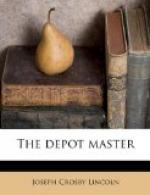“Wat’s that letter you’re readin’, Obed?” she called from her post by the sink.
“Nothin’,” said her brother, gruffly, crumpling up the sheet of note paper and jamming it into his pocket.
“My sakes! you’re shorter’n pie crust to-night. What’s the matter? Anything gone wrong at the store?”
“No.”
Silence again, only broken by the clatter of dishes. Then Polena said:
“Obed, when are you goin’ to take me up to the clubroom so’s I can see that picture of Major Hardee that he presented the club with? Everybody says it’s just lovely. Sarah T. says it’s perfectly elegant, only not quite so handsome as the Major reelly is. She says it don’t flatter him none.”
“Humph! Anybody’d think Hardee was some kind of a wonder, the way you women folks go on ’bout him. How do you know but what he might be a reg’lar fraud? Looks ain’t everything.”
“Well, I never! Obed Gott, I should think you’d be ’shamed of yourself, talkin’ that way. I shan’t speak another word to you to-night. I never see you act so unlikely. An old fraud! The idea! That grand, noble man!”
Obed tried to make some sort of half-hearted apology, but his sister wouldn’t listen to it. Polena’s dignity was touched. She was a woman of consequence in East Harniss, was Polena. Her husband had, at his death, left her ten thousand dollars in her own right, and she owned bonds and had money in the Wellmouth Bank. Nobody, not even her brother, was allowed to talk to her in that fashion.
To tell the truth, Obed was sorry he had offended his sister. He had been throwing out hints of late as to the necessity of building an addition to the paint and oil store, and had cast a longing look upon a portion of Polena’s ten thousand. The lady had not promised to extend the financial aid, but she had gone so far as to say she would think about it. So Obed regretted his insinuations against the Major’s integrity.
After a while he threw the account books upon the top of the chest of drawers, put on his hat and coat and announced that he was going over to the depot for a “spell.” Polena did not deign to reply, so, after repeating the observation, he went out and slammed the door.
Now, two hours later, as he stood in the doorway of the club, he was debating what he should do in a certain matter. That matter concerned Major Hardee and was, therefore, an extremely delicate one. At length Mr. Gott climbed the narrow stairs and entered the clubroom. It was blue with tobacco smoke.
The six or eight members present hailed him absently and went on with their games of checkers or “seven-up.” He attempted a game of checkers and lost, which did not tend to make his temper any sweeter. His ill nature was so apparent that Beriah Higgins, who suffered from dyspepsia and consequent ill temper, finally commented upon it.
“What’s the matter with you, Obed?” he asked tartly. “Too much of P’lena’s mince pie?”




